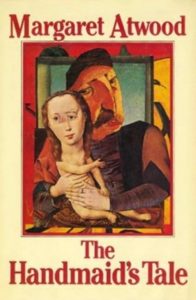 I was 23 years old when Margaret Atwood first published The Handmaid’s Tale. I assumed then it was an historical fiction novel set in Puritan New England. Interested, I put it on a long and growing list of books-to-read-once-I-finished-college-got-married-raised-kids-started-a-teaching-career . . . Thirty-plus years later, I’m finally getting to it. Turning the first page, I was prepared for fundamental religious rigor, witch hunts, misogyny – at least I thought I was.
I was 23 years old when Margaret Atwood first published The Handmaid’s Tale. I assumed then it was an historical fiction novel set in Puritan New England. Interested, I put it on a long and growing list of books-to-read-once-I-finished-college-got-married-raised-kids-started-a-teaching-career . . . Thirty-plus years later, I’m finally getting to it. Turning the first page, I was prepared for fundamental religious rigor, witch hunts, misogyny – at least I thought I was.
In this now classic, modern era, dystopian novel, a catastrophic event has occurred, resulting in a declining birth crisis and the subsequent take-over of parts of the country by what appears to be a fanatic, theocratic, patriarchal entity. It’s unclear what this event was, but as the story unfolds, we hear of resistance movements, battles, radiation contamination, and attempts to escape into Canada. It can be assumed we’re at war on some level. The vague specificity regarding with whom or what seems to seriously bother some readers. To me, that’s not the point. This story explores what it would look like should a fanatic group, in this case, a male dominated, ultra-conservative religious organization, were to seize control and pass laws stripping all rights from large segments of the population. Besides, history has demonstrated that just because you can’t imagine a future that would allow such inconceivable atrocities doesn’t mean it couldn’t happen. The how, especially given human nature and our ability to rationalize and/or justify certain unacceptable behaviors, isn’t in question here. It’s the ‘what if’. In an article on LitHub, Atwood herself writes, “Nations never build apparently radical forms of government on foundations that aren’t already there.” Just as with many unfathomable historical events, the vast majority of this fictional population neglects or refuses to see where things are headed and ends up either being assimilated or annihilated. The rest is about how the new society reacts and then adapts.
What begins with the freezing of all female-owned assets and bank accounts, develops into a methodical and sinister plan to strip fundamental rights from all female citizens. This then morphs into a sick, ritualistic practice in which healthy women of childbearing age are given to certain men in political favor as property/Handmaids. They are encouraged, even required, to impregnate their property in order to add to and strengthen the fledgling society’s population. Handmaids leave the house to shop for food only once a day (other female servants are forbidden to leave the house for any reason) and are given new names to reflect that of their owner. Although we see a glimpse of her life “before”, the only name by which we ever know our narrator is Offred – Of Fred. The story of Offred’s life in the new Republic of Gilead chronicles her journey from self-sufficient working wife and mother, to Handmaid. Unlike her strong-willed, rebellious friend, Moira, Offred is not particularly tough or heroic. She spends her days fearfully going through the motions, doing what she’s told, just trying to survive. What would you do? What would I do?
This book is dark, depressing, and disturbing. I found it more thought-provoking than entertaining. A statistically unimaginable chain of events would be required for something like this to take place in reality. However, I won’t say it never could. Atwood also writes: “I made a rule for myself: I would not include anything that human beings had not already done in some other place or time, or for which the technology did not already exist. I did not wish to be accused of dark, twisted inventions, or of misrepresenting the human potential for deplorable behavior. The group-activated hangings, the tearing apart of human beings, the clothing specific to castes and classes, the forced childbearing and the appropriation of the results, the children stolen by regimes and placed for upbringing with high-ranking officials [echoes of another recent novel, Before We Were Yours], the forbidding of literacy, the denial of property rights — all had precedents, and many of these were to be found, not in other cultures and religions, but within Western society. . .”
I’m ordering a hardback copy and adding this novel to my personal library. It might even make my “shelfie”, but I won’t be rereading it anytime soon. Is it possible to give a four-star rating when you didn’t particularly enjoy reading a book? Atwood just recently published a sequel to The Handmaid’s Tale and has titled it The Testaments. It was just named this year’s Booker Prize recipient alongside Girl, Woman, Other by Bernardine Evaristo. Right now, I’m not ready to return to Gilead even to see what happened next, but I’m putting it on my already long and growing list of books-to-read-during-winter-break-once-I-get-the-back-deck-stained-figure-out-facebook/instagram/twitter-. . .

